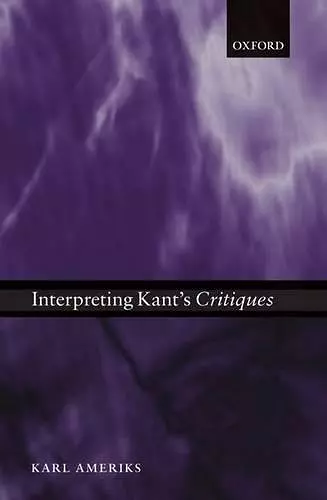Interpreting Kant's Critiques
Format:Paperback
Publisher:Oxford University Press
Published:28th Aug '03
Currently unavailable, and unfortunately no date known when it will be back

Karl Ameriks here collects his most important essays to provide a uniquely detailed and up-to-date analysis of Kant's main arguments in all three major areas of his work: theoretical philosophy (Critique of Pure Reason), practical philosophy (Critique of Practical Reason), and aesthetics (Critique of Judgment). A substantial, specially written introduction sets out common themes in the structure and interpretation of Kant's Critical philosophy. The first part of the book includes several of the author's well-known essays on the Critique of Pure Reason , emphasizing Kant's central theoretical notions of a transcendental deduction and transcendental idealism, and providing an extensive review of recent English and German scholarship in this area. Part II includes new discussions of the Critique of Practical Reason and its relation to Kant's other main work in moral theory, the Groundwork of the Metaphysics of Morals. Part III focuses on taste and the Critique of Judgment, and on the controversial hypothesis that even in this area Kant's position is fundamentally objective and conceptual. This collection has two distinctive characteristics. First, it demonstrates in detail how, for understanding the basic structure of any one of Kant's Critiques, it is extremely important and helpful to keep in mind its logical and historical relation to Kant's other Critiques - and hence to track the parallels and differences between theoretical, practical, and aesthetic forms of judgment and reason. Secondly, the book makes interpretation itself a central issue. That is, not only does it offer a series of interrelated interpretations of Kant's main works, along with a detailed comparison and assessment of other interpretations, but it also argues that the difficulty of interpretation is itself a central feature of the Critical philosophy, and that the difficulties of that philosophy have become paradigmatic for modern philosophy in general. Interpreting Kant's Critiques complements and extends the arguments of the author's earlier books, Kant's Theory of Mind and Kant and the Fate of Autonomy. It will find a wide readership not just amongst Kant specialists but among the many philosophers following in his footsteps.
For any student of Kant's critical philosophy, this work merits serious, attentive reading. Ameriks provides here a perhaps unequaled orientation to the positions and approaches in contemporary Kant scholarship both Anglo-American and German (a daunting body of work and thus an impressive accomplishment itself). The collection attests to the value of Ameriks' long devotion to Kantian philosophy and the interpretation thereof, to his analytical carefulness and sensitivity to historical context, both Kant's and our own; his accounts of Kant's deduction arguments are, one and all, meticulous. * Notre Dame Philosophical Reviews *
Ameriks provides an invaluable service to Kant scholarship, a deeply and notoriously partisan field, in warning against the dangers of reconstructive distortion, and to all readers of Kant in elaborating and powerfully defending his controversial-traditionalist interpretation. * Notre Dame Philosophical Reviews *
ISBN: 9780199247325
Dimensions: 232mm x 157mm x 18mm
Weight: 492g
360 pages